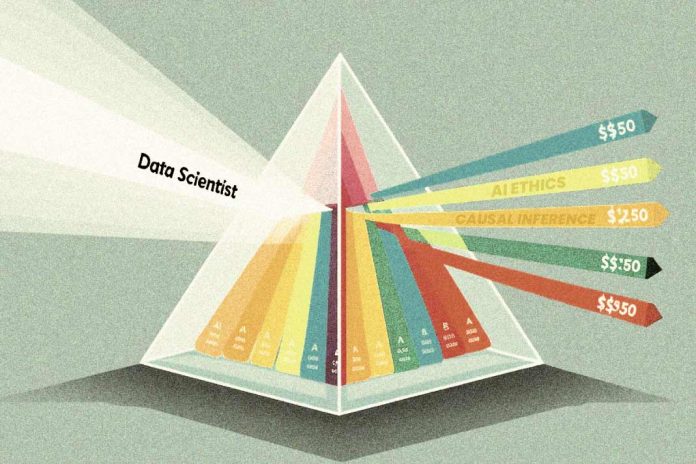A decade ago, the role of “data scientist” was hailed as the sexiest job of the 21st century. Today, the role has evolved into something far more complex and strategic. The explosive growth of artificial intelligence (AI) has bifurcated the field: the generalist who can run basic queries is becoming a commodity, while the specialist who can drive business outcomes is more valuable than ever.
Thriving in this dynamic landscape isn’t just about coding; it’s about mastering the right mix of technical depth, business acumen, and strategic insight. So, what truly sets the top-tier data scientists apart? Let’s break down the seven skills that define the modern data leader.
1. Specialise in ML, NLP, or Deep Learning
The era of the data science generalist is fading. Today, deep expertise in a high-demand niche like machine learning (ML), natural language processing (NLP), or deep learning is what commands a premium. These specialisations are the engines of modern innovation, from using NLP to analyse customer sentiment to deploying deep learning for computer vision in retail. Companies are not just looking for someone who can use these tools; they are seeking talent that can build and fine-tune models to solve specific, high-value business problems.
2. Master Core Programming with Python, R, and SQL
Strong programming skills in Python, R, and the Structured Query Language (SQL) remain the foundational grammar of data science. Python and R are the workhorses for model building and statistical analysis, while SQL is the universal language for data extraction and management. Employers value professionals who are fluent across this stack, able to move seamlessly from querying a database to deploying a complex algorithm.
3. Gain Expertise in Data Engineering with Spark and Hadoop
A sophisticated model is useless without clean, reliable data. Data scientists who understand data pipelines, extract, transform, load (ETL) processes, and big data frameworks like Spark or Hadoop are invaluable. They bridge the critical gap between raw data and actionable insights. This hybrid capability enables faster data access, better model performance, and smoother scaling, making these professionals essential for any large-scale AI initiative.
4. Excel at Data Wrangling and Exploratory Data Analysis (EDA)
Before any model is built, the data must tell its story. Experts who excel at data wrangling and conducting exploratory data analysis (EDA) are the ones who reveal the hidden patterns and business opportunities that others miss. Their work—cleaning messy datasets, identifying outliers, and visualising distributions—lays the foundation for all impactful analytics, making them central to the decision-making process.
5. Drive Insights with Data Visualisation in Tableau or Power BI
Technical skill without influence is a wasted asset. Data scientists who can translate complex findings into clear dashboards and compelling narratives using tools like Tableau, Power BI, or Plotly are force multipliers. They make data accessible to non-technical stakeholders, bridging the gap between insight and action. This ability to influence with clarity is one of the most highly compensated skills in the field.
6. Operationalise Models with MLOps and GenAI Awareness
A model that only works on a laptop is a liability. As AI systems become more complex, professionals who understand machine learning operations (MLOps) are essential for managing the full lifecycle of a model in production—from deployment and monitoring to versioning and retraining. This operational discipline, combined with an awareness of the latest GenAI trends, separates the academic from the enterprise-ready professional.
7. Build Scalable Systems with Cloud Platforms and APIs
Modern data science is cloud-native. The ability to build, train, and deploy scalable models directly within platforms like Amazon Web Services (AWS), Azure, or Google Cloud Platform (GCP) is now a baseline expectation. When combined with Application Programming Interface (API) integration knowledge, these professionals can connect their models to the rest of the business, turning a standalone algorithm into a product feature. This makes them highly valuable in any product-driven team.
From Analyst to Strategist
The seven skills listed above point to a single, powerful trend: the data scientist role is evolving from a technical analyst to a strategic partner. The most valuable professionals are no longer just those who can build the most accurate model, but those who can understand a business problem, build the right solution, and ensure it delivers measurable impact at scale. This full-stack capability—blending science, engineering, and strategy—is what truly defines the data science salary boom.
